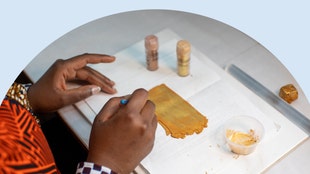Friendly disclaimer: If you list products for sale on Etsy, you must comply with all federal, state, and local legal requirements and Etsy policies applicable to those products and product listings. This article provides a general overview of intellectual property for informational purposes only, is subject to change over time, and is not legal advice. It is not intended to create, and receipt of it does not constitute, a lawyer-client relationship. The authors, Etsy, Inc. and Etsy Ireland UC, disclaim all responsibility for any and all losses, damages, or causes of action that may arise or be connected with the use of or reliance on these materials. Please consult an attorney or legal expert if you have any questions.
Intellectual property (IP) is a type of property for which creators and makers have certain ownership rights. It's important for you to understand the various types of IP and how they differ, both to protect your own shop and to understand the rights of third parties.
Different intellectual property terms like copyright, trademark, and patent mean different things, and one item can have multiple types of IP. You can spot each of them once you’ve learned what each term means. Here’s a simple way to remember the differences:
Take a pen. If you draw something with the pen, it's a work of authorship that’s immediately copyrighted. The logo on the pen is usually a trademark—the brand or company the pen is from. If the pen looks unique, it may also be protected by trade dress (the look and feel of a product that identifies its source) for a similar reason. The ink in the pen could be made by using a new invention that is patented.
Common intellectual property terms
Copyright
Copyright protects “works of authorship” like books, movies, music, or other artistic works. You get copyright protection as soon as you “fix” the creative work in a tangible form–even if you haven’t registered the copyright. Someone can interfere with copyright rights by copying the work, either in whole or in part. There are a bunch of rules on how long a copyright lasts, but it's usually about 100 years from when it was created.
There are a few well-known defenses to copyright protection like fair use (or fair dealing). These rules vary by country, and can be complicated. For example, you shouldn’t assume a use is fair just because others do it, it's available for free, or because it only copies part of a work. On the other hand, sometimes someone may assert rights over something you legitimately believe is fair use. For the US, you can find information on fair use at places like the US Copyright Office.
Trademarks
Trademarks protect the “source or sponsorship” of a product or service. They can be a word, a picture, or even a color, smell, or sound—again, when associated with the source of a product or service. Usually, if you interfere with someone’s trademark rights, it's because you’ve created a “likelihood of confusion” with the trademark, when someone would be confused whether it comes from the trademark owner or you.
Generally, trademark rights are protected as soon as you use it commercially (or "in commerce") for your product, and your rights get stronger the more they are used. They last as long as the trademark continues to be used and protected; if a trademark owner doesn’t take action to protect their rights, their rights may be weakened.
There are some defenses to using someone’s trademark such as fair use, but they vary by country, and a fair use defense to trademark infringement is subject to different rules than a fair use defense for copyright infringement. For the US, you can find more information and resources via the US Patent and Trademark Office.

It may be tempting to include names of popular brands or celebrities in your listing titles, tags or descriptions—for instance, the name of a luxury handbag company that inspired your purse design. But using that brand’s name in your tags may be considered problematic by some IP owners. Similarly, just tacking on “inspired by” or “____-like” in the tags or description may not prevent you from receiving a notice of infringement from the IP owner for a number of legal reasons, such as causing confusion. The same goes for any items that were “inspired by” popular books, movies or television shows.
Patents
Patents protect new and non-obvious inventions—usually for a product or a process. Patents can be expensive to obtain, and may take years to register. Understanding patent rights can be exceedingly challenging. It involves understanding a patent’s claims, if a patent is valid, and how they relate to a product. Most people consult with an attorney about a potential patent dispute.
Patent laws differ greatly from country to country. Also, unlike most other IP rights, there’s no analogous “fair use” right for a patent under US law.
Return to the Ultimate Guide to Intellectual Property
 Words by Etsy Staff
Words by Etsy Staff




